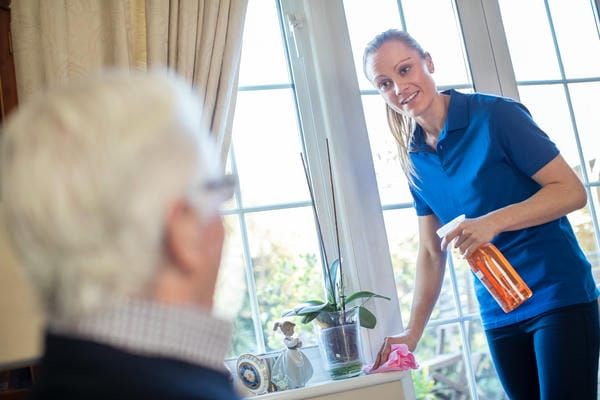For many older adults living with chronic health conditions, the support and dedication of caregivers can make all the difference in their quality of life and ability to maintain independence. Whether it’s a family member, friend, or professional home health aide, these unsung heroes play a crucial part in ensuring those with long-term illnesses receive the compassionate, comprehensive care they need.
Unfortunately, the vital role of caregivers is often overlooked or underappreciated. Many people mistakenly believe that once a loved one is diagnosed with a chronic condition, the healthcare system will seamlessly step in and handle everything. In reality, family caregivers bear the brunt of the day-to-day responsibilities, oftentimes putting their own needs on the backburner.
In this in-depth guide, we’ll shine a spotlight on the remarkable contributions of caregivers and explore practical ways they can provide support, while also taking care of themselves in the process. Because when it comes to navigating the complexities of chronic illness, having a dedicated, well-equipped caregiver in your corner can quite literally be a life-changer.
The Challenges of Chronic Illness
Dealing with a long-term, incurable health condition is no easy feat, for the patient or their loved ones. Chronic illnesses like heart disease, diabetes, Parkinson’s, and Alzheimer’s often require a delicate balancing act of symptom management, lifestyle modifications, and coordinated medical care. And the physical, emotional, and financial toll can be absolutely exhausting.
For the patient, chronic illness can mean:
- Persistent, debilitating symptoms that severely impact quality of life
- The need for complex, round-the-clock medication regimens
- Frequent doctor’s appointments and hospitalizations
- Difficulty performing everyday tasks and maintaining independence
And for the caregiver, it often translates to:
- Juggling work, family responsibilities, and caregiving duties
- Dealing with the emotional strain of watching a loved one’s health decline
- Learning complex medical skills to provide hands-on care at home
- Navigating the frustrating bureaucracy of the healthcare system
- Struggling to find time for self-care and respite
It’s a lot for anyone to handle, which is why the role of caregivers is so vital. They’re the glue that holds everything together, providing a lifeline of support, comfort, and advocacy amidst the chaos of chronic illness.
The Indispensable Caregiver
When a loved one is diagnosed with a chronic condition, caregivers often find themselves thrust into a whole new realm of responsibilities. And while it can feel overwhelming at first, their contributions are truly indispensable.
Perhaps most importantly, caregivers serve as a critical bridge between the patient and their healthcare team. They attend doctor’s appointments, take meticulous notes, and ask the tough questions that patients may be too intimidated or fatigued to voice themselves. This ensures the care plan is tailored to the individual’s unique needs and that no important details fall through the cracks.
Caregivers also play a hands-on role in symptom management, medication administration, and basic activities of daily living. From helping with bathing and dressing to preparing nutritious meals and managing finances, they handle an endless array of practical tasks that allow the patient to maintain as much independence as possible. And in cases of cognitive decline, like with Alzheimer’s or dementia, caregivers become the patient’s primary advocate, making critical decisions on their behalf.
But the caregiver’s role extends well beyond just the medical and logistical components. They also provide invaluable emotional support, serving as a sounding board, cheerleader, and source of comfort during the ups and downs of chronic illness. Something as simple as just being present, holding a hand, or lending a listening ear can make an enormous difference in the patient’s overall wellbeing and outlook.
“Chronic illness can be an incredibly isolating experience,” explains Sarah, who has cared for her mother with Parkinson’s for the past 7 years. “As the caregiver, you become a lifeline – not just for practical help, but for that human connection and emotional support that patients so desperately need. It makes all the difference in the world.”
The Caregiver’s Toolkit
Given the daunting array of responsibilities that come with caring for a loved one with a chronic condition, it’s essential that caregivers are equipped with the right knowledge, resources, and support systems. Here are some key elements to have in their caregiving toolkit:
Medical Expertise
While caregivers don’t need to become medical experts overnight, a basic understanding of the patient’s diagnosis, symptoms, and treatment plan is crucial. This might include learning how to properly administer medications, recognize warning signs of complications, and navigate the healthcare system.
Many chronic illness organizations and local community centers offer educational workshops and training programs to help equip caregivers with these essential skills. And don’t be afraid to lean on the patient’s doctors and nurses – they’re usually more than happy to provide guidance and resources.
Care Coordination
Juggling doctor’s appointments, medication schedules, insurance claims, and more can quickly become overwhelming. That’s why it’s so important for caregivers to develop strong organizational and communication skills.
Things like maintaining a detailed care journal, creating digital calendars and reminders, and establishing clear points of contact with the healthcare team can make a world of difference. Caregivers may also want to explore care coordination services or adult day programs that can help shoulder some of the logistical burden.
Self-Care Strategies
Perhaps most importantly, caregivers need to prioritize their own health and wellbeing. Chronic stress, burnout, and compassion fatigue are all very real risks, which is why it’s essential to build in regular opportunities for rest, relaxation, and rejuvenation.
This might include setting boundaries around work or family commitments, practicing stress management techniques like meditation or yoga, and making time for enjoyable hobbies and social connections. Joining a caregiver support group can also be incredibly valuable, providing a space to share experiences, access resources, and feel less alone.
“As a caregiver, it’s easy to get so consumed by your loved one’s needs that you neglect your own,” notes Sarah. “But you have to remember – you can’t pour from an empty cup. Taking care of yourself has to be just as much of a priority, otherwise you risk burning out and being unable to provide the support your loved one really needs.”
Building a Care Team
The good news is, caregivers don’t have to go it alone. Assembling a comprehensive support network – whether it’s family members, friends, or professional in-home aides – can make a world of difference in managing the demands of chronic illness care.
For many older adults, a combination of family caregiving and part-time in-home assistance is the ideal solution. Professional home health aides can provide hands-on help with activities of daily living, therapy services, and respite care, while family members handle tasks like coordinating medical appointments, managing finances, and offering companionship.
And don’t forget the valuable role that community resources can play. Adult daycare programs, support groups, meal delivery services, and other local initiatives can provide much-needed relief, resources, and social engagement for both the patient and the caregiver.
The key is to avoid trying to shoulder the entire burden yourself. By building a robust care team and tapping into all available sources of support, caregivers can ensure their loved one receives the comprehensive, compassionate care they deserve – without sacrificing their own health and wellbeing in the process.
Honoring the Caregiver’s Contribution
At the end of the day, caring for a loved one with a chronic illness is one of the most selfless, challenging, and rewarding roles a person can take on. Caregivers become a lifeline, a source of comfort, and an indispensable partner in the patient’s journey – all while juggling their own responsibilities and needs.
It’s a role that deserves far more recognition and support than it typically receives. That’s why it’s so important for healthcare providers, community organizations, employers, and loved ones to make a concerted effort to honor and uplift the vital contributions of caregivers.
This might include things like:
- Providing respite care, support groups, and other resources to prevent caregiver burnout
- Advocating for better caregiver support policies, such as paid family leave or tax credits
- Educating the public on the crucial role caregivers play in chronic illness management
- Checking in regularly on caregivers’ wellbeing and offering practical assistance when needed
After all, when caregivers are empowered, equipped, and cared for themselves, it translates to better outcomes for the patient as well. It’s a rising tide that lifts all boats – and one that we all have a responsibility to champion.
So the next time you encounter a caregiver, whether it’s a family member, friend, or professional aide, take a moment to express your gratitude. Offer to lend a helping hand, connect them with support services, or simply listen as they share their story. A little bit of acknowledgement and support can go a long way in sustaining these unsung heroes who make such an immeasurable difference in the lives of those they serve.





